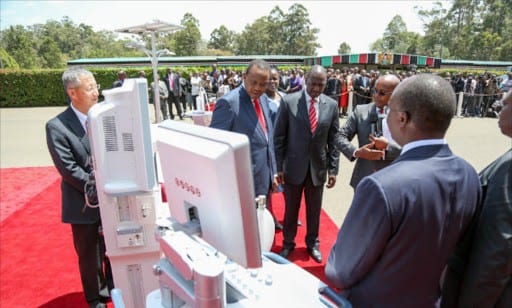Last updated on September 11th, 2021 at 02:43 pm
Billions shillings of taxpayer’ money is going down the drain in the controversial Sh63 billion leased medical equipment services (MES) programme, a new report shows.
The report says some of the equipment that cost billions of shillings is still gathering dust while others are yet to be supplied despite the government having paid for them.
The report titled ‘The Leasing of Medical Equipment Project in Kenya: Value for Money Assessment’ was authored by the Institute of Economic Affairs.
The report concludes that Kenyans are not getting value for money in the ambitious project that was envisioned to equip health facilities with state-of-the-art machines.
The report puts Ministry of Health officials on the spot for what it calls lack of due diligence, arbitrary revision of project costs and violations of various provisions of the law.
MES involves leasing of assorted medical equipment – including ICU facilities, surgical theatres, radiology and renal equipment– to 104 select county and national government hospitals.
The seven-year contract was signed in May 2015 with an initial cost of Sh38 billion. The contract was reviewed along the way and the cost increased to Sh63 billion. “Study findings indicate that a number of factors negatively impacted overall implementation of the MES Project, leading to poor service delivery results,” the report reads.
It said the project was doomed by failure on the ministry to carry out a comprehensive study of the disease burden and health infrastructure needs across all the 47 counties.
“Besides, lack of transparency on the entire project with regard to the terms and conditions of the contract and poor regulation of this typical public private partnership project increases financial and corruption risks,” the report says.
The Institute of Economic Affairs interviewed informants in counties, a supplier of the equipment and reviewed government documents, audit reports and conducted stakeholder mapping and public forum workshops on the programme.
Last year, Council of Governors chairman Wycliffe Oparanya told an ad hoc committee of the Senate that has been probing the programme since last September that the counties did not get the value for money for the deal.
Oparanya said that most governors were coerced into signing an MoU that sanctioned that deal. Some equipment, he said, was delivered at night.
The Kwame Owino-led institute said in the report that lack of documentation on the procurement processes at counties, inaccessibility of the Intergovernmental Agreement on leasing, lack of explanation on lease rentals and lack of specific details on medical equipment to be delivered put the project in doubt.
The institute recommended a special audit on the entire programme to ascertain whether the taxpayers got a raw deal.
“The objective of these audits is to assess whether county government spending on leased medical equipment is promoting prudent use of funds, achieving set targets and improving systems,” it said.
The medical equipment should be redistributed based on the needs assessment and the disease burden in every county, the report said.
“There is need for a redistribution of machines informed by the evaluation exercise earlier mentioned and based on availability of medical personnel and supporting infrastructure as well as health needs,” the report said.
(TheStar)

